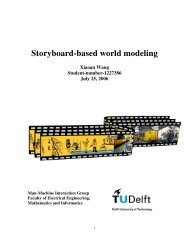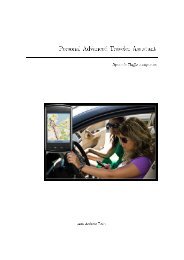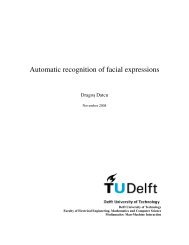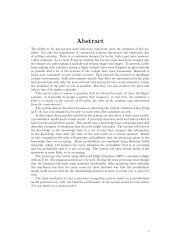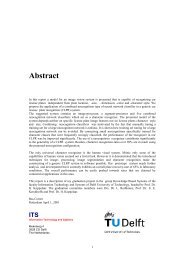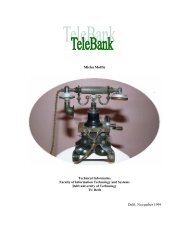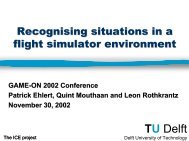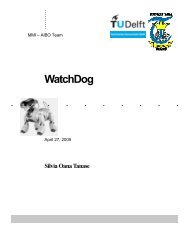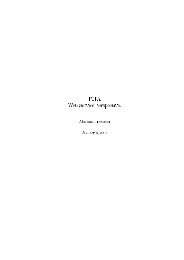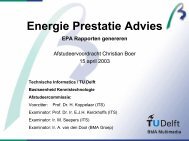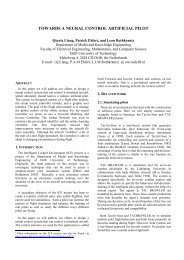Abstract - Knowledge Based Systems Group - TU Delft
Abstract - Knowledge Based Systems Group - TU Delft
Abstract - Knowledge Based Systems Group - TU Delft
You also want an ePaper? Increase the reach of your titles
YUMPU automatically turns print PDFs into web optimized ePapers that Google loves.
I N T ERN SH I P T U D EL FT – SERI O U S GA M I N G RO T T ERD A M U N I V ERSI T Y / C M I<br />
D I GI T A L U N I V ERSI T Y PA GE 1 6 1 2 - 0 1 - 2 0 0 8<br />
Chapter 2<br />
Blender<br />
2.1 Blender information<br />
Blender is open-sourced, community developed software based in the Netherlands.<br />
The software allows for the design and development of 3D models, animations,<br />
photo realistic graphics, architectural walk-throughs, and 3D games. The growing<br />
success of the blender program comes from contributors world-wide. Each<br />
contributor works freely to enhance the program. Blender is comparable to<br />
programs like Maya, Lightwave, and 3D Studio. The biggest difference is that<br />
Blender is free.<br />
Blender was developed as an in-house application by the Dutch animation studio<br />
Neo Geo and Not a Number Technologies (NaN). It was primarily authored by Ton<br />
Roosendaal, who had previously written a ray tracer called Traces for Amiga in<br />
1989. The name "Blender" was inspired by a song by Yello, from the album Baby.<br />
Roosendaal founded NaN in June 1998 to further develop and distribute the<br />
program. The program was initially distributed as shareware until NaN went<br />
bankrupt in 2002.<br />
The creditors agreed to release Blender under the terms of the GNU General Public<br />
License, for a one-time payment of €100,000. On July 18th 2002, a Blender funding<br />
campaign was started by Roosendaal in order to collect donations and on September<br />
7th 2002, it was announced that enough funds had been collected and that the<br />
Blender source code would be released. Blender is now an open source program<br />
being actively developed under the supervision of the Blender Foundation.<br />
The Blender Foundation initially reserved the right to use dual licensing so that, in<br />
addition to GNU GPL, Blender would have been available also under the "Blender<br />
License", which did not require disclosing source code but required payments to the<br />
Blender Foundation. However, this option was never exercised and was suspended<br />
indefinitely in 2005. Currently, Blender is solely available under GNU GPL.<br />
Blender has a great verity of options. Starting with the modeling tool integrated in<br />
the game engine (Game Blender). This has some advantages comparable to the<br />
other modeling tools and game engines. These advantages of Blender will be<br />
explained later on.<br />
2.2 Game Blender information<br />
Game Blender is a sub-application of Blender, the popular open source 3D<br />
application, used to make games using Blender. It is an outgrowth of the application<br />
that Blender once was, which was a 3D application to make games for the Sony<br />
Playstation. The new Game Engine was written from scratch in C++, including<br />
support for standards like Python scripting and OpenAL 3D sound. Blender, being<br />
programmed in C and Game Blender in C++ kept development strictly separated.<br />
SVEN ANKER - 0773594<br />
ROB VAN DER KAMP - 0772800



